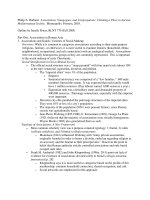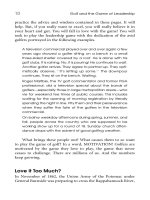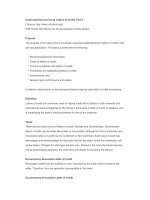Tài liệu Golf and the game of leadership 6 ppt
Bạn đang xem bản rút gọn của tài liệu. Xem và tải ngay bản đầy đủ của tài liệu tại đây (192.24 KB, 10 trang )
40
Golf and the Game of Leadership
The ‘‘Tuesday Group’’
For many years on Tuesday mornings, when our Midwest weather
permits, I have met with Bob Lauer (Mr. Navy), Ralph Rogers
(Speedy), Vince Richard (One-Putt), Dick Rice (Smoothie), Stan
Moyer (Laugh-A-Minute), and Dick Heckman (Lefty) for an early
morning round of golf at historic Ottawa Park. Laid out in 1899,
Ottawa Park is the oldest 18-hole public golf course west of New
York. This narrow, rolling, tree-lined layout tests a golfer’s accu-
racy. It is one of Toledo’s most popular courses. We like it because
it has a lot of character, and quite frankly is not as long as some
other courses we might play.
The ‘‘Tuesday Group’’ does not follow the ‘‘rules’’ listed
above. In deference to our senior amateur status, we make a few
allowances. At each golfer’s discretion, the option of one mulligan
for front- and back-nine tee shots is granted. We also tend to be
generous in the event of the nasty ‘‘unplayable lie,’’ if relief is
requested. We know the rules of golf. We also know we are playing
the game for enjoyment and not to qualify for the Champions
Tour. So, we have a few ‘‘gentlemen’s agreements,’’ which for our
circumstance no less a golf traditionalist than Ben Crenshaw says
are okay. But when we apply ‘‘our special rules’’ we also readily
admit we are not playing to the ‘‘real rules of golf.’’
‘‘Real golfers’’ play by the rules, albeit some with acceptable
‘‘gentlemen’s agreements.’’ Those who do not play by the rules—
that is, those who cheat—are viewed with disdain. Those who
attempt to make their scores appear better than they actually are
rarely go undetected. Similarly, the leader who does not play by
the rules is not exercising ‘‘real leadership’’ and is perceived a
failed leader by his or her followers. Golf is an individual game,
as is leadership. ‘‘I’’ is at the center of the word ethical, there is no
they. Don’t just talk a good game, play a good game.
Golf’s Code of Rules
The Golfer’s Home Companion
2
traces the rules of golf ‘‘back to
1744, when the Honourable Company of Edinburgh Golfers (the
first known golf club, which is now located at Muirfield Golf Club,
to the east of the Scottish capital) persuaded the city fathers to
10589$ $CH4 02-23-04 16:44:30 PS
41
Play by the Rules
put up a trophy that members could compete for annually. To the
Honourable Company, the ‘Silver Club’ meant formal recogni-
tion. But in order to stage the tournament equitably, the club had
to draw up a code of conduct.
The first ‘‘Code of Rules’’ amounted to thirteen articles, and
remarkably many of the original rules remain virtually unchanged
today. However, more rules have been added over the years. The
Official Rules of Golf, as approved and published by The United
States Golf Association (USGA) and the Royal and Ancient Golf
Club of St. Andrew, Scotland, now cover etiquette; definitions;
the rules of play; teeing ground; playing the ball; the putting
green; ball moved, deflected, or stopped; relief situations and pro-
cedure; other forms of play; administration; local rules; conditions
of the competition; design of clubs; the ball; miscellaneous; and
rules of amateur status.
3
The rules apply to all golfers, and are
strictly adhered to by professionals and competitive amateurs.
Golfers police the rules themselves. Only if there is a question of
rule interpretation is a PGA official consulted.
As this is written, the PGA Tour is announcing a club-testing
process to ensure the legality of the golf clubs being used in tour
events. The spring-like effect of the new class of ‘‘hot’’ drivers has
allowed many golfers to significantly improve their driving dis-
tance off the tee. Consequently, some people are questioning
whether or not the USGA’s club spring limitations are being met.
All golf clubs and balls are required to meet established specifica-
tions, although golfers generally rely on their manufacturers to
meet these requirements.
The PGA tour will begin using the new test in January of
2004. The test machine will be on-site at all PGA sponsored
events. Interestingly, in keeping with the game’s tradition of integ-
rity, the test will not be mandatory. As always, the players are
expected to be honest and to monitor themselves. Will there be a
need for a whistle-blower? I don’t think so.
Play by Your Own Rules?
Vince Flynn, in his national bestseller Term Limits, illustrates a
different and all-too-often-held view of how to exercise the power
placed in the hands of a leader:
10589$ $CH4 02-23-04 16:44:30 PS
42
Golf and the Game of Leadership
Garret’s plan was simple. All he had to do was continue to
portray the president as a victim and hope those idiots over at
the FBI could catch these people. He smiled at how easy it was
to play the power game against principled men like Roach.
While they took the time to decide if a course of action was
right or wrong, Garret worried only about being caught. He
had no time for petty little laws and technicalities, and he
definitely had no time for someone else’s morals. He was there
to get things done, and to play by his own rules.
4
People playing by their own rules can disrupt a game of golf.
Leaders who play by their own rules, and not by those governing
the rest of the organization, provide poor examples. Their actions
can lead to less than optimum organizational performance.
When a new president was named to head a huge, world-wide
merchandising organization, he told his new subordinates that it
was now ‘‘his turn’’ to get the top executive perks. Just weeks after
instituting a severe cost-cutting program across the organization,
the president attended a large industry convention in San Fran-
cisco. He booked the finest suite in an expensive hotel. For his
own purposes, he ordered underlings to install a large refrigerator
in his suite.
When the refrigerator was delivered, it was too large to fit
through the hotel room doorway. In order to comply with the
president’s demand, the staff arranged for a window in the 26th-
floor suite to be removed and for the refrigerator to be lifted in
through the window frame by a huge crane. At the end of the
convention, the president simply left the unit in the hotel and
went home.
Everyone in the company who knew about the refrigerator
incident found little motivation to further cut any of their ex-
penses. And you tell me, who in the company didn’t hear the
‘‘refrigerator story?’’ Just as the rules of golf apply to all who play,
there should not be a set of rules for the boss and a different set
for other members of the organization. If there are, everybody
loses.
It takes great courage to report misconduct on the golf course,
10589$ $CH4 02-23-04 16:44:30 PS
43
Play by the Rules
and even more to do so within one’s own organization. Whistle-
blowers are given a very difficult time. In most cases, it is a David
and Goliath scenario. Yet Cynthia Cooper of WorldCom, Coleen
Rowley of the FBI, and Sherron Watkins of Enron—Time maga-
zine’s ‘‘2002 Persons of the Year’’—took huge personal and pro-
fessional risks to report what was wrong within their respective
organizations. ‘‘In so doing,’’ as reported in Time’s December 30,
2002 issue, ‘‘they helped remind us what American courage and
American values are all about.’’ They reminded all of us that it is
the leaders’ obligation, at all levels, to play by the rules and to
exemplify the highest code of conduct.
It is unfortunate that we have seen, see, and will continue to
see, people who play the leadership game by their own rules. Some
even appear to get away with it. They adhere to the politics of
personal power and not to the politics of the greater good. They
are not real leaders but simply power brokers who by circum-
stance are able to wreak havoc on people and organizations until
they are forced from their positions of power. Many of us at one
time or another have been victims of this kind of person. Two
questions:
1. Are you one of them?
2. Are you playing and/or tending to play the politics of per-
sonal power or the politics of the greater good?
And add a third question:
3. Do you sleep well at night?
The Rules Are for Everyone
Contrast the ‘‘refrigerator story’’ with the example of the outdoor
furniture and accessories outlet owner who returned from lunch
one day with his general manager. They noticed that the display
lot was littered with paper and trash. This was despite the owner’s
insistence on clean, attractive premises. The general manager said
she would immediately get the lot porter to clean up the debris.
10589$ $CH4 02-23-04 16:44:31 PS
44
Golf and the Game of Leadership
The owner said no, and that he and the general manager would
clean it up. He was fully aware that what they were doing would
be reported within the ranks. Within minutes, the word spread
through the grapevine to all 100 employees of the outlet that the
‘‘old man’’ really meant what he said about good housekeeping.
It was everyone’s job, even the owner’s, not just that of the lowest
paid person on the staff. Good example travels fast.
A Short Self-Assessment
In our leadership development and consulting work, we use the
Adaptive Leader Skills Assessment (ALSA) to measure perceptions
of a leader’s effectiveness. The ALSA uses a forced distribution
requirement to aid in the identification of a leader’s more effective
and less effective skills. The ALSA ‘‘ethics cluster’’ includes,
among others, the five skills shown in Figure 4-1.
Scorecards are integral to the game of golf. They measure the
golfer’s performance level. I suggest you score yourself on your
leadership ethics skills, using the scale shown in Figure 4-1. Using
a forced distribution, rank order the skills from 5 (most effective)
to 1 (least effective). Your scoring will provide a measurement of
relative effectiveness on these skills.
These may be simple instructions, but if you scored yourself
I suspect that it was somewhat difficult to work out the forced
distribution. Hopefully, the process generated some thoughtful
insights into your quest to be an even more ethical leader.
Now, if you are interested and brave enough, ask some of
your colleagues or direct reports to rate you using the same forced
distribution. Any difference between their perception of your eth-
ical behavior and your own evaluation is important for you to
know and analyze.
Why Be Ethical?
Why be ethical? Mark Roe and Jesper Parnevik were disqualified
following the third round of the 2003 British Open, which was
played in Sandwich, England on the Royal St. George’s course.
10589$ $CH4 02-23-04 16:44:31 PS
45
Play by the Rules
FIGURE 4-1.
Sample leadership ethics assessment.
As a leader, I:
Demonstrate trustworthiness.
Give credit where credit is due.
Promote what is right, not what is safe and easy.
Model honesty.
Demonstrate people matter to me.
Using a forced distribution, rank order the skills from 1 (least
effective) to 5 (most effective), according to the following
leadership effectiveness scale:
1—Least effective
2—Less effective
3—Acceptable
4—More effective
5—Most effective
S
OURCE
: Adaptive Leader Consulting Associates, Ltd., Adaptive
Leader Skills Assessment. Copyright 1994.
The reason for the disqualification was that they failed to ex-
change scorecards at the first hole of play, as is the correct proce-
dure. This meant that when they signed their cards at the end of
the round they had signed for what were in effect their playing
partner’s scores, not their own. When they turned the cards in to
the Royal and Ancient official scorers at the end of the round, the
cards were checked and accepted as okay. However, after the golf-
ers left the scorer’s tent the error was discovered. The rule-making
Royal and Ancient Club later accepted some blame for the official
scorers not having detected the error when they reviewed the
scorecards with the players. A special committee considered the
possibility of waiving the rule and allowing Roe and Parnevik to
play the fourth round, but decided against it. The responsibility
10589$ $CH4 02-23-04 16:44:32 PS
46
Golf and the Game of Leadership
for correct scoring was the golfers’. Roe had finished the round
just three shots from the lead, and had a clear possibility of win-
ning the Open, while Parnevik was 15 shots behind the leader.
Later, an obviously disappointed but noncomplaining Roe told a
news conference, ‘‘Rules are there to protect the game.’’
Ethical behavior protects the players in the leadership game,
both leaders and followers. Ethics refers to the rules and guide-
lines of conduct by which we try to live. These underpin the rela-
tionships between people and their organizations. Leaders have
the responsibility for upholding and fairly administering organi-
zational rules, policies, and standards. Often these are not as
simple and straightforward as the rules and courtesies of play as-
sociated with the game of golf. Rather, they are often complex in
their application because we are required as leaders to make deci-
sions that require balancing company needs with employee needs,
budget goals, or business objectives while maintaining human
goals, doing what’s right for the greater good, and being tough yet
fair and compassionate.
Survive the Cut
Leadership decisions can be difficult, even anguishing, at any level
of the organization. A good ethical compass, a code of conduct,
sound values and policies are all needed to guide the leader. Deci-
sions made in difficult circumstance, if thoughtful and well inten-
tioned, will generally come out just fine. Act with integrity, a sense
of fairness, and a focus on doing what is right and you will sleep
well at night.
The first objective of the professional or amateur golfer play-
ing in a tournament is to ‘‘survive the cut.’’ Thursday and Friday
play determines who will play on the weekend. Approximately
half of the starting field survives. The rest go home. The weekend
players earn money whether they finish first or last. Those who
don’t qualify for Saturday and Sunday are shut out.
Organizations also need to play well against the competition,
make the cut to survive, and strive to be at least among the best
at the end of Sunday’s play. Competition for survival and success
10589$ $CH4 02-23-04 16:44:32 PS
47
Play by the Rules
is intense. New products and technologies come on the business
scene just as increasing numbers of talented young players join
the PGA Tour. Leaders must deal with new challenges to their
organizations and with the impact they have on their followers.
Win or Lose, Respect the Game
I was part of such a ‘‘new’’ challenge at Owens-Illinois Incorpo-
rated (O-I) from 1986 to 1987. O-I was a successful company
dating back to the 1920s. Its principal business historically was,
and still is, glass container packaging. O-I was an original member
of the Dow 30. A paternalistic company from the start, O-I was a
highly ethical company that placed high value on its employees
and their welfare. O-I was in the top 80 of the Fortune 100 in
sales, and in the top 40 in number of employees.
In 1986, senior O-I executives entered discussions about ‘‘tak-
ing O-I private’’ with Kohlberg, Kravis, and Roberts (KKR), a
New York investment banking firm. Following a back-and-forth
of alternative strategies, a KKR offer was judged to be the best
shareholder value, and O-I went private in 1987.
In 1988, O-I was a leaner, more efficient organization. It had
reduced layers of management, gotten out of poor-return-on-
investment holdings, and was focused on its core business. The
leaders of O-I, up and down the line, were dramatically impacted
by the changes in the company. As the efforts to make and keep
O-I competitive moved forward, many employees of all ages were
devastated as they lost their jobs and their dream of long-term job
security. It was a very difficult, emotion-filled time for those stay-
ing as well as those leaving.
I was proud of the way the organization offered help to people
and of the actions of front-line leaders, who fairly and thought-
fully dealt with the individual trauma of severe workforce reduc-
tion. Efforts included offering early retirement programs, special
payment opportunities for those not eligible for retirement, em-
ployee counseling, resume and job placement services, and health
benefit continuation. Every effort was made to help people work
through individual hardships. Front-line leadership handled dif-
10589$ $CH4 02-23-04 16:44:32 PS
48
Golf and the Game of Leadership
ficult, even agonizing situations and did so professionally. They
demonstrated the ability to balance the needs of the business with
the individual needs of their employees. They showed that they
were ‘‘real leaders.’’
A senior O-I executive summed up the O-I struggle with
change with this personal perspective. ‘‘When I left O-I in 1988, I
liked the company less than I had in 1962 when I joined it, but I
respected it more. The international economy and rapidly chang-
ing technology had forced change. A series of capable CEOs and
COOs had directed the change and done it well. Personally, I had
made a good living, had enjoyed my work for the most part, felt I
had contributed significantly to the progress of O-I, and got to
know some of the finest people in the world.’’
Win or lose, you should respect the game. Be proud of how
well you play and what you achieve. And respect and enjoy your
playing partners in the leadership game.
It is critical for you, for all leaders, to have a personal code of
conduct and to perform to a high ethical standard. Your followers
expect and deserve no less from you than integrity, fairness, hon-
esty, trust, and the determination to do what’s right. Such behav-
ior is a requirement of leadership excellence on a personal level.
Remember you are always under the microscope of your obser-
vant colleagues at all levels. As an automotive parts plant manager
liked to remind his people, ‘‘You are about to take an action you
are not convinced is the right thing to do. Stop, and ask yourself,
if I do this will I mind if it is reported as a front page headline in
tomorrow morning’s newspaper?’’
Rules and codes of conduct can be viewed as limiting, and
they certainly are. They can also be viewed as defining the game,
making it unique from other activities. This is true both of the
game of golf and of the game of leadership, though the rules of
the latter are not so clearly defined as they are in golf.
Learn What Not to Do
One of the realities of leadership is that some of the most powerful
lessons learned are ‘‘what not to do’’ rather than ‘‘what to do.’’
10589$ $CH4 02-23-04 16:44:33 PS
49
Play by the Rules
After all, if you at least know what not to do you shouldn’tbe
making that mistake. Leaders have provided case studies of what
not to do for centuries. Consider what Cicero wrote 2000 years
ago:
The Six Mistakes of Man
1. The delusion that personal gain is made by crushing
others.
2. The tendency to worry about things that cannot be
changed or corrected.
3. Insisting that a thing is impossible because we cannot
accomplish it.
4. Refusing to set aside trivial preferences.
5. Neglecting development and refinement of the mind,
and not acquiring the habit of reading and studying.
6. Attempting to compel others to believe and live as
we do.
Sound familiar? Ever make any of these mistakes? Are you
making any of them now?
Learn What to Do
Here’s another list of actions. I’ve developed this list based on
my experiences and my observations of ‘‘real leaders,’’ intent on
effectively and ethically playing the leadership game.
Real Leaders
1. Envision and pursue the greater good.
2. Ethically and enthusiastically excite, educate, empower,
enable, and expect.
3. Realistically control and/or influence.
4. Pursue the six C’s: caring, credible, committed, consis-
tent, confident, and courageous.
10589$ $CH4 02-23-04 16:44:33 PS









